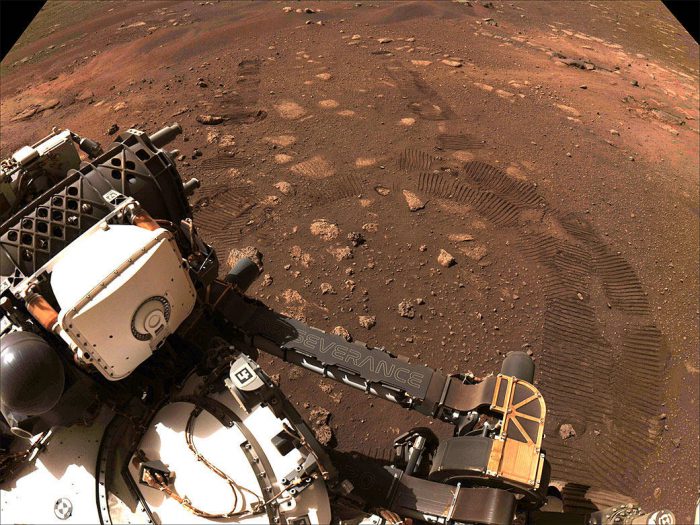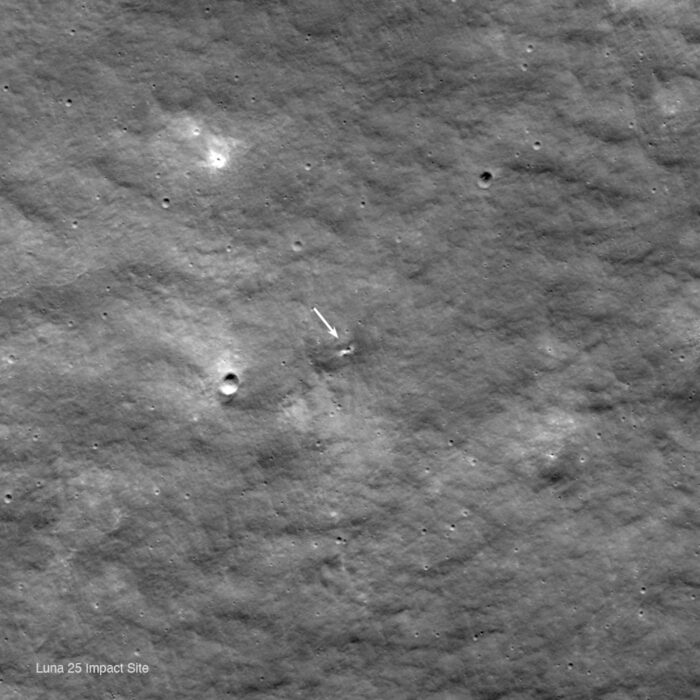The speed of sound is pretty darn fast.
It took decades of innovation to build an airplane capable of traveling faster than it. And when something breaks that speed barrier, it's such a big deal that we get a massive explosion of noise—the sonic boom. Ka-POW!
Of course, compared to that other famous speed plateau—the speed of light—it's barely a gentle trot. But what the speed of sound may lack in, well, speed, it makes up for in being weird.
Where the speed of light is a universal constant (the same anywhere), the speed of sound fluctuates all over the place depending on where sound is happening. And now, thanks to research conducted by NASA's rover Perseverance, we know that the speed of sound on Mars is maybe the weirdest of all!
That's because sound is not only slower on Mars than on Earth, it travels at two different speeds there.
(Get ready, everyone—this is a pretty science heavy post! Just take a few deep breaths and take your time. Let's explore!)
Denser = faster!

Sound from this speaker travels at different speeds through different objects. (Wikimedia Commons)
First, let's do a quick primer on how sound travels.
Sound is made by vibrations of the molecules in a 'medium'. A medium is basically any substance—solid, liquid, or gas. And in the case of sound, the denser—or more tightly packed together the molecules are in—the medium, the faster the sound travels through it. (That's why there's no sound in space. There's no medium for the sound to travel through in a vacuum!)
For example, at room temperature, sounds travels at the following speeds here on Earth:
- Air: 343 metres per second
- Water: 1437 m/s
- Wood: 3850 m/s
- Glass: 4540 m/s
- Aluminum: 6320 m/s
To be clear, faster does not mean clearer. Hearing a sound through many feet of concrete will sound muffled compared to hearing it through just air. But the sound will still travel faster through that concrete.
Neat!
Martian double take

Perseverance has been very busy on its new home. (NASA)
So now that we know this, let's move on to Mars!
The Martian atmosphere is far less dense than Earth's. The atmospheric pressure at sea level on Earth is 14.7 pounds per square inch (psi). On Mars, it's just 0.095 psi. This is why sound travels much slower on Mars (240 m/s) than on Earth (343 m/s), a fact that scientists have long known.
But instruments on board Perseverance were able to determine something scientists did not already know. That sounds that were under 240 hertz (Hz) traveled even slower than that—just 230 m/s.
Which probably leads you to ask...
What's a hertz?
Hertz is the unit used to measure a sound's 'frequency', or how often it completes a full vibration. It is a measurement of vibrations per second—one hertz = one vibration per second.
Higher sounds—like a chirping bird—vibrate faster than do lower sounds—like a big, booming bass drum. Hertz are used by everyone from engineers to musicians to scientists to accurately measure the frequency of the sounds around us! Hertz does not measure the loudness of a sound, though—that is measure in decibels (dB).
Mars' magic mark
Heading back to Mars again, the data from Perseverance showed that any sound above 240 Hz traveled slightly faster than any sound below that mark.
What does 240 Hz sound like? Listen to the video below to hear that tone (just turn your volume down so you're not surprised by it).
What does this mean practically speaking? If you could hear someone else speak on Mars, potentially some pretty weird stuff! Human speech hovers right around 240 Hz:
- Adult males: 85 to 155 Hz
- Adult females: 165 to 255 Hz
- Children: around 300 Hz
And depending on the person and how excited they are as they speak, that range can move around a lot. So potentially, different parts of even the same sentence that another person said to you could reach your ears at slightly different times. Enough that researchers said that it would be an "unique listening experience" listening to speech or music (which has all sorts of sounds above and below 240 Hz) on Mars.
This is, by the way, an experience that is not likely to happen any time soon. If ever. (We can't breathe on Mars and would always have to be wearing pressurized gear or in rooms that made the atmosphere like what we know on Earth.)
But it's a pretty cool thing to think about, right? Thanks for reading!
But, wait! WHY??
What's that? Oh, right! We almost forgot!
Why does the sound travel at two different speeds!
So Mars' atmosphere is about 95% carbon dioxide (CO2), which is why it would be so poisonous to us. And as we mentioned, it is also a very thin atmosphere under very low pressure. Something very curious happens to CO2 molecules hit by sound at such low pressure.
When hit by frequencies above 240 Hz, the CO2 molecules don't have time to return to their original state, or to 'relax', as the scientists put it. That's honestly a difficult thing to picture, we have to admit. But what this comes down to essentially is that the atmosphere is so thin and 'loose' that it reacts differently when hit by different sounds.
If you're a bit confused, that's okay. You're not an atmospheric scientist and neither are we! But it sure is interesting to think about just how mysterious and full of surprises our own solar system is. We bet that you won't listen to a person's voice or music quite the same way now!
 The haze of a Martian sunset, as seen through its very thin atmosphere. (NASA)
The haze of a Martian sunset, as seen through its very thin atmosphere. (NASA)










Amazing story today. Thank you!
Whoooooooo Knnewwwwwwwwww ?